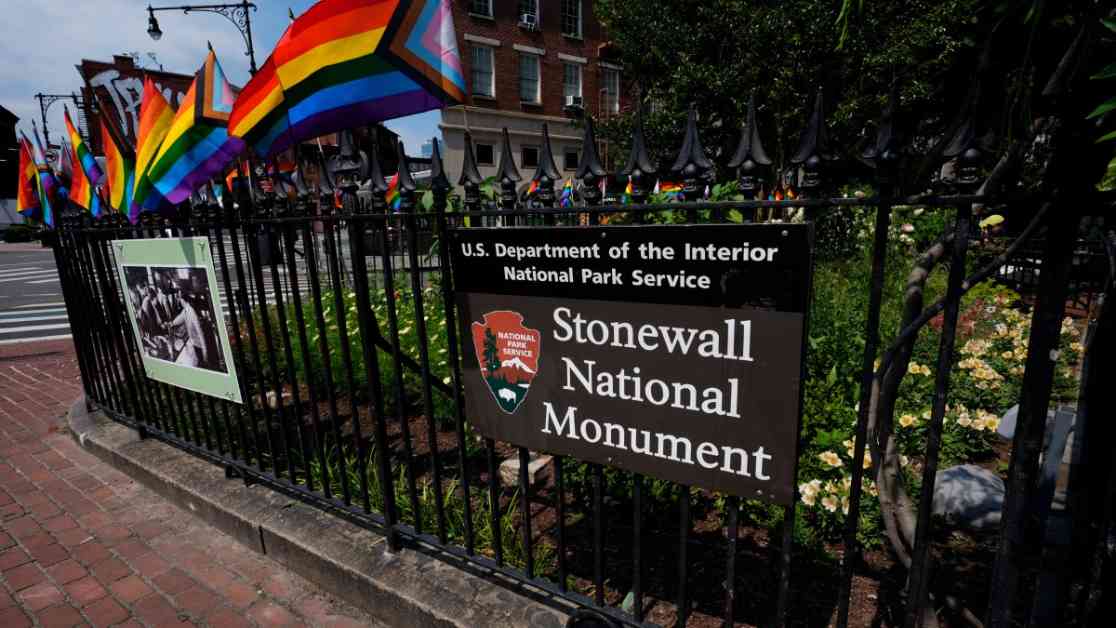On a seemingly ordinary day, a significant shift occurred that sent shockwaves through the LGBTQ+ community and beyond. The Stonewall National Monument, a cherished landmark in New York City commemorating the historic 1969 Stonewall riot, found itself at the center of controversy as references to transgender individuals were scrubbed from the National Park Service website. This move came swiftly after President Donald Trump signed an executive order that sought to redefine sex as strictly male or female, erasing the nuanced existence of transgender individuals.
The monument, nestled in Manhattan’s Greenwich Village, stands as a testament to the resilience and bravery of the gay and transgender individuals who sparked the LGBTQ+ rights movement during the Stonewall uprising. The park, located across from the iconic Stonewall Inn, witnessed a pivotal moment in history on June 28, 1969, when members of the gay and transgender community bravely resisted a police raid, igniting a battle for equality that continues to this day.
Despite its historical significance, the website for the Stonewall National Monument underwent a troubling transformation. The once-inclusive language that celebrated the contributions of transgender activists was suddenly stripped of words like “transgender” and “queer.” Even the acronym LGBTQ was sanitized, with the letters T and Q replaced by terms like “LGB rights movement” or “LGB civil rights.”
The alterations did not go unnoticed, sparking outrage from Governor Kathy Hochul of New York, who condemned the erasure of transgender voices. She aptly pointed out that transgender individuals have been instrumental in the fight for LGBTQ+ rights, and their vital role should never be diminished or forgotten.
As the dust settled on this contentious decision, the present-day custodians of the Stonewall Inn, along with The Stonewall Inn Gives Back Initiative, voiced their dismay at the changes. They decried the revisionist approach that not only distorted history but also disrespected the pivotal role of transgender individuals, particularly transgender women of color, in the Stonewall Riots and the broader LGBTQ+ rights movement.
Stacy Lentz, CEO of The Stonewall Inn Gives Back Initiative, expressed deep concern, likening the act of erasure to an attempt to “cis-wash” LGBTQ history. Lentz emphasized the alarming nature of such revisions, highlighting the importance of preserving the truth and honoring the diverse voices that have shaped our collective narrative.
For Angelica Christina, a board director at the initiative and a transgender woman, the changes were sadly expected given the current political climate. However, she found it deeply unsettling to witness the Stonewall National Monument, a beacon of hope for the LGBTQ+ community, come under attack. The sanctuary that had long provided solace and acceptance suddenly felt vulnerable and tainted by exclusionary policies.
The National Park Service, responsible for safeguarding our nation’s most treasured sites, remained silent in the face of mounting criticism. Questions loomed about the implications of Trump’s executive order on the future of the monument and its commitment to preserving an accurate and inclusive history.
Timothy Leonard, Northeast program manager for the National Parks Conservation Association, underscored the futility of attempting to rewrite history through erasure. He emphasized that the National Park Service’s core mission is to educate visitors about America’s rich and diverse heritage, including the invaluable contributions of the transgender community at Stonewall and beyond.
In 2016, then-President Barack Obama designated the Stonewall National Monument, recognizing its profound significance in LGBTQ+ history. Last year, a state-of-the-art visitor center funded by private donations and the park service’s charitable arm opened its doors, offering a deeper dive into the Stonewall story.
Trump’s executive order, which sought to reduce sex to a binary concept of male and female, has drawn praise from conservative groups while sparking debate among medical and psychiatric experts. The American Medical Association and American Psychiatric Association maintain that gender exists on a spectrum, challenging the rigid definition imposed by the administration.
In response to the contentious alterations, a protest was organized at the monument to denounce the erasure of transgender voices and reaffirm the enduring legacy of the LGBTQ+ community. As the sun set over Manhattan, activists and allies gathered to defend the fundamental principle that history should be preserved, not rewritten to suit a narrow agenda.
In a time where inclusivity and acceptance are paramount, the battle for visibility and recognition rages on. The Stonewall National Monument stands as a symbol of resilience, a beacon of hope for generations to come, and a reminder that the fight for equality is far from over.












